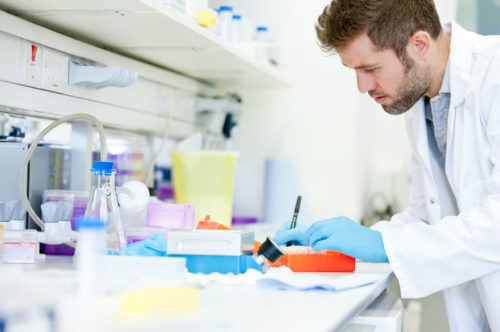About the course
The rapidly growing field of bioengineering applies the principles of design, modularisation and analysis to the development of biomedical technologies, devices and systems. This course provides you with a thorough understanding of bioengineering, as well as related biochemical and biophysical sciences, giving you opportunities to gain the practical techniques and skills you need to work in the bioengineering field.
To start with, you build your knowledge of living systems through the study of core units in human anatomy and physiology; microbiology and biochemistry; chemistry; and molecular genetics. As you advance in your studies, you explore a range of life sciences and technologies relevant to bioengineering, considering their application in regional, national and global contexts. This may include how bioengineering is applied in areas such as biomaterials and tissue engineering; the development of new medical and imaging devices; portable diagnostic technologies; or monitoring systems for food and environmental quality.
Why choose this course?
- Explore current and emerging areas of bioengineering such as genetic engineering, synthetic biology and cell factories to produce bioactive molecules for pharma-biotech use
- Work with our expert Life Sciences team, all of whom are actively involved in research
- Benefit from access to the high-spec science facilities in our STEM building including state-of-the-art laboratories
- Build your research skills with a novel advanced bioengineering research project
- Work closely with industry representatives and gain valuable work experience through our Life Sciences Liaison Board, which has strong links to a network of organisations including government regulatory agencies and the health sector
- When you graduate, choose from a number of career paths including government agencies; industry; research and development; and higher education institutions
Unit Information – What will I learn?
- Cell Biology (BHS012-1) Compulsory
- Chemistry (BHS022-1) Compulsory
- Essential Skills In Bioengineering (BHS015-1) Compulsory
- Human Anatomy And Physiology (BHS004-1) Compulsory
- Microbiology And Biochemistry (BHS002-1) Compulsory
- Molecular Genetics (BHS016-1) Compulsory
- Applications Of Bioengineering (BHS038-2) Compulsory
- Biochemical Techniques (BHS053-2) Compulsory
- Biochemistry (BHS039-2) Compulsory
- Biotechnology (BHS031-2) Compulsory
- Food Microbiology (BHS032-2) Compulsory
- Innovation In Biosciences (BHS033-2) Compulsory
- Molecular Assembly Of Living Systems (BHS037-2) Compulsory
- Skills In Science (BHS022-2) Compulsory
- Bioengineering Research Project (BHS050-3) Compulsory
- Biofermentation And Bioreactor Engineering (BHS051-3) Compulsory
- Bioinstrumentation (BHS053-3) Compulsory
- Biomechanics (BHS052-3) Compulsory
- Food Processing (BHS055-3) Compulsory
- Genetic Engineering (BHS054-3) Compulsory
- Bioengineering Masters Research Project (BHS041-6) Compulsory
- Biomaterials (BHS042-6) Compulsory
- Bioprocess Engineering (BHS040-6) Compulsory
- Synthetic Biology (BHS039-6) Compulsory
Zobacz więcej na stronie uniwersytetu >>
Wiza studencka do Wielkiej Brytanii
Aby studiować w Wielkiej Brytanii potrzebujesz wizy studenckiej. Aby złożyć wniosek o taką wizę studencką musisz zdjać certyfikat językowy na poziomie B2.
Uważaj! Do celów wizowych musisz wybrać wyłącznie egzamin w wesji Secure English Language Test (SELT) UKVI .
Co to jest test SELT UK VI registration? Przeczytaj więcej o testach SELT UKVI >>




















